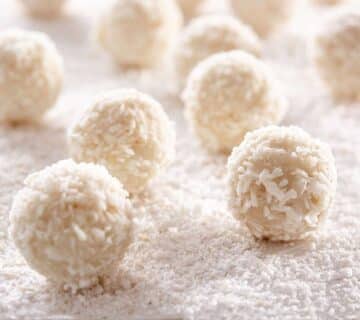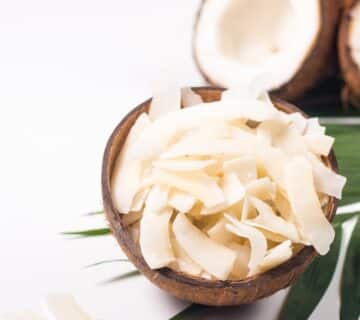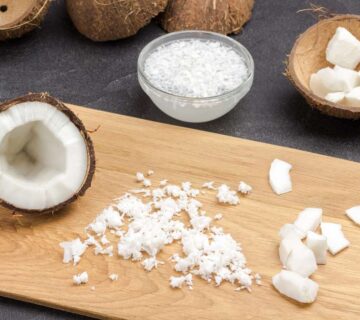As a health enthusiast, you might have a question of ‘Is Coconut Gluten-Free?’. In recent years, the gluten-free diet has gained immense popularity due to the growing awareness of celiac disease and non-celiac gluten sensitivity. For those following a gluten-free diet, it’s crucial to scrutinize every food item for hidden sources of gluten.
Also, for those with celiac disease or non-celiac gluten sensitivity, avoiding gluten is crucial for their health. This dietary shift has led many to scrutinize their food choices and question the gluten content of various products, including coconut-based foods.
In this article, we will explore the question: Is coconut gluten-free? and explaining whether we can use coconut as a gluten free diet.
Is Coconut Gluten Free?
Coconut is a tropical fruit commonly used in various culinary applications and is inherently gluten-free. It is derived from the coconut palm and is not related to the grains (wheat, barley, and rye) that contain gluten. Coconut is safe for those with celiac disease and non-celiac gluten sensitivity.
Nutritional Content of Coconut
Coconut is a highly nutritious fruit. It provides a unique combination of nutrients that make it a valuable addition to one’s diet. Here are the key nutritional components found in coconut:
1. Dietary Fiber
Coconut contains a good amount of dietary fiber, both soluble and insoluble. Dietary fiber aids in digestion, helps prevent constipation, and may contribute to a feeling of fullness, making it useful for weight management.
2. Healthy Fats
Coconuts are renowned for their high content of healthy fats, primarily in the form of medium-chain triglycerides (MCTs). MCTs are easily digestible and are believed to have various health benefits, including providing a quick source of energy.
3. Protein
While not as rich in protein as some other foods, coconuts do contain a small amount of protein. This can contribute to your overall protein intake when consumed as part of a balanced diet.
4. Vitamins
Coconuts are a good source of essential vitamins, particularly vitamin C and various B vitamins, including folate and niacin. These vitamins play important roles in immune function, energy metabolism, and overall health.
5. Minerals
Coconuts are rich in essential minerals such as potassium, manganese, and copper. Potassium is crucial for maintaining proper heart and muscle function, while manganese and copper are essential for various metabolic processes in the body.
6. Electrolytes
Coconut water is a natural source of electrolytes, including potassium, sodium, and magnesium. It is often recommended as a natural way to rehydrate and restore electrolyte balance.
7. Phytonutrients
Coconuts also contain various phytonutrients, including polyphenols, flavonoids, and antioxidants. These compounds have been linked to potential health benefits, such as reducing oxidative stress and inflammation.
Can Coconut-Derived Products Be Used in a Gluten-Free Diet?
Coconut products are generally considered safe for inclusion in a gluten-free diet. However, it’s important to understand and be cautious about the potential sources of gluten contamination in processed coconut products.
Here’s a closer look at how different coconut-derived products fit into a gluten-free diet:
1. Coconut Flour
Coconut flour is an excellent choice for those following a gluten-free diet. It is naturally gluten-free and can be used in baking as a substitute for wheat flour. It adds a unique coconut flavor to dishes and provides dietary fiber.
2. Coconut Oil
Coconut oil is pure fat and does not contain gluten. It is commonly used for cooking and baking in gluten-free recipes. It adds a delightful tropical aroma to dishes without introducing gluten.
3. Coconut Milk
Canned or boxed coconut milk is made by blending coconut flesh with water, and is naturally gluten-free. It is a versatile dairy alternative used in both sweet and savory recipes in gluten-free cooking.
4. Coconut Water
Coconut water is the clear liquid found inside young green coconuts. It is a naturally gluten-free beverage and often consumed by people in Asia. It is often consumed for its hydrating properties and is safe for those on a gluten-free diet.
5. Desiccated Coconut
Unsweetened desiccated coconut is typically gluten-free. However, flavored or sweetened versions of desiccated coconut may contain gluten-containing additives, so it’s essential to read labels carefully.
6. Coconut Sugar
Coconut sugar is typically gluten-free, but it’s essential to check labels to ensure there are no gluten-containing additives. It can be used as a natural sweetener in gluten-free recipes.
7. Coconut Cream
Coconut cream, often used in curries and desserts, is also gluten-free but keep in mind to always verify the ingredient list to confirm that there are no gluten-containing additives.
Are You Considering Adding Coconut-Based Foods to Your Gluten-Free Diet?
Coconut products can be an excellent addition to a gluten-free diet. However, it’s vital to exercise caution, especially if you have celiac disease or a high sensitivity to gluten. With these considerations in mind, you can enjoy the versatility and health benefits of coconut while maintaining a gluten-free lifestyle.
Are you in search of high-quality coconut products supplier from Indonesia? Look no further since Sari Coconut is here to be your trusted partner in the world of coconut-based products. We source our coconuts from the lush plantations of Indonesia, ensuring that you receive the finest and freshest coconut products with every order.
If you’re ready to explore the world of delicious and nutritious coconut-based products, reach out to us today for expert guidance, bulk ordering options, or any questions you may have. Get in touch with Sari Coconut!
FAQ
1. Is coconut gluten-free?
Yes, coconut in its natural form, including fresh coconut meat, coconut water, and coconut oil, is naturally gluten-free. It is a safe choice for those with gluten-related disorders.
2. What should I be cautious about when using processed coconut products?
When using processed coconut products, be mindful of potential cross-contamination in facilities that handle gluten-containing ingredients. Check ingredient labels for gluten-containing additives.
3. Are coconut-derived products gluten-free?
In general, most coconut-derived products like coconut oil, coconut milk, coconut water, and coconut flour are naturally gluten-free. However, it’s important to check labels for any potential sources of gluten.
4. Can I use coconut flour as a gluten-free substitute for wheat flour in recipes?
Yes, coconut flour is a popular gluten-free alternative for baking. It adds a unique coconut flavor and is rich in fiber, making it suitable for many gluten-free recipes.
5. Can I use coconut products in a gluten-free diet?
Yes, coconut products are a valuable addition to a gluten-free diet. They are versatile and can be used in a wide range of recipes, adding flavor and nutrition.






